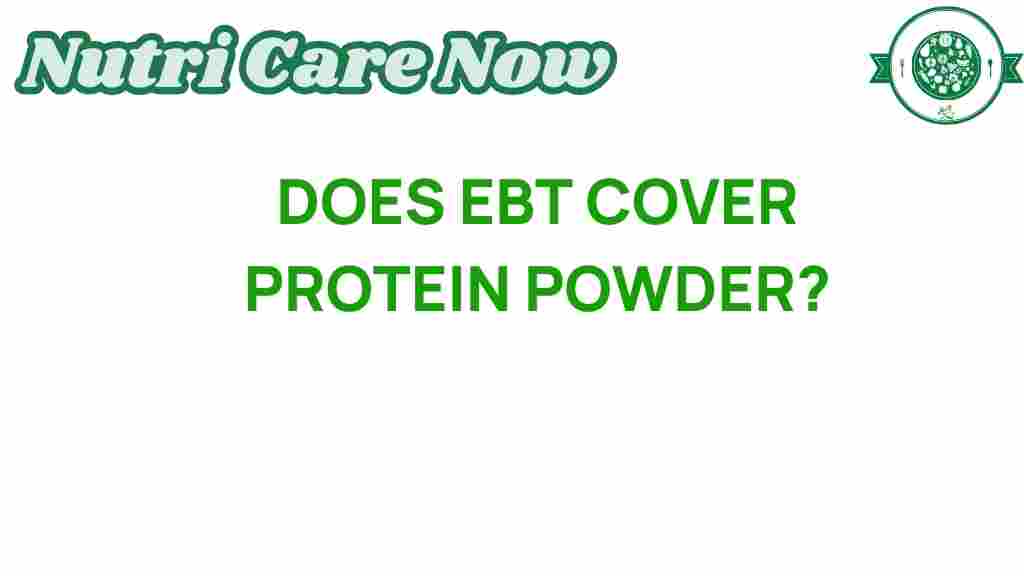Unpacking EBT Eligibility: Does It Cover Protein Powder?
In the realm of nutrition assistance programs, understanding what items are eligible for purchase with Electronic Benefit Transfer (EBT) cards can be crucial for many individuals and families relying on welfare programs like the Supplemental Nutrition Assistance Program (SNAP). With a growing interest in health and wellness, many people wonder if protein powder falls under the umbrella of eligible food benefits. This article aims to unpack EBT eligibility concerning protein powder, exploring the nuances of dietary supplements and how they relate to SNAP benefits.
Understanding EBT and SNAP
The Electronic Benefit Transfer (EBT) system is a method used by state welfare programs to distribute government benefits, primarily for food assistance. The most well-known of these programs is the Supplemental Nutrition Assistance Program (SNAP), which helps low-income individuals and families afford nutritious food.
EBT cards function like debit cards, allowing recipients to purchase eligible food items at participating retailers. However, not all items are covered, leading to confusion when it comes to dietary supplements such as protein powder.
What is Protein Powder?
Protein powder is a popular dietary supplement often used by athletes, fitness enthusiasts, and individuals looking to increase their protein intake. It is available in various forms, including whey, casein, soy, pea, and more. Protein powder can be incorporated into smoothies, shakes, and recipes to boost protein levels conveniently.
Are Protein Powders Considered Eligible Food Benefits?
To determine if protein powder can be purchased with EBT, it’s essential to understand the guidelines set forth by the USDA regarding SNAP benefits. Generally, SNAP benefits can be used to purchase:
- Fruits and vegetables
- Meat, poultry, and fish
- Dairy products
- Breads and cereals
- Snack foods and non-alcoholic beverages
However, dietary supplements like protein powder can be a gray area. The USDA specifies that items intended for a special dietary need or that are marketed as dietary supplements may not qualify as eligible food benefits. This means that protein powder, while it is a food product, might not be accepted in some cases.
Eligibility Factors to Consider
When evaluating whether you can purchase protein powder with EBT, consider the following factors:
- Type of Product: Some protein powders are labeled as dietary supplements, while others may be marketed as food products. Look for labeling that designates the product as a food item.
- Store Policies: Retailers have varying policies on what they allow for EBT purchases. Some stores may permit protein powder purchases, while others may not.
- State Regulations: Each state has its regulations regarding what can be bought with SNAP benefits. Always check with your local SNAP office for specific guidelines.
How to Determine EBT Eligibility for Protein Powder
To determine if you can use your EBT card to purchase protein powder, follow these steps:
- Check the Label: Look for the product’s labeling. If it states it is a food product and not a dietary supplement, you may have a better chance of purchasing it with EBT.
- Consult Store Staff: When in doubt, ask the staff at the store. They are typically familiar with what items can be purchased using EBT.
- Research Local Regulations: Visit your state’s SNAP website or contact them directly to understand local rules regarding dietary supplements.
- Use an EBT-Approved Retailer: Ensure you are shopping at a retailer that participates in the EBT program.
Common Questions About EBT and Protein Powder
As you navigate the complexities of EBT eligibility, you may have some common questions. Here are answers to a few of them:
Can I buy any type of protein powder with EBT?
No, not all protein powders are eligible for purchase with EBT. It depends on the product’s labeling, whether it is classified as a food, and store policies.
What if the protein powder is part of a meal replacement shake?
Meal replacement shakes that include protein powder may be eligible if they are marketed as food products and not as dietary supplements. Again, check the labeling and store policies.
Are there alternative sources of protein I can buy with EBT?
Yes! If you are unable to purchase protein powder with EBT, consider these alternatives:
- Meat and poultry
- Fish and seafood
- Dairy products like yogurt and cheese
- Beans and legumes
- Nuts and seeds
Tips for Maximizing Your EBT Benefits
To make the most of your EBT benefits, consider the following tips:
- Plan Your Meals: Create a meal plan to ensure you are using your benefits wisely and purchasing items that provide balanced nutrition.
- Look for Sales: Take advantage of sales and discounts to stretch your food budget further.
- Explore Local Resources: Check if your local food banks or community programs offer additional resources for nutrition assistance.
Conclusion
Understanding EBT eligibility with respect to protein powder can be confusing, but it’s essential for those relying on nutrition assistance programs. While some protein powders may be purchased with EBT, others may not qualify due to their classification as dietary supplements. Always check product labels, consult store staff, and research your local regulations to make informed purchasing decisions.
For more information about SNAP benefits and EBT eligibility, you can visit the USDA SNAP website. If you’re interested in further exploring nutrition assistance options, check out this resource for tips on maximizing your food benefits.
By staying informed about what you can purchase with EBT, you can ensure that you are meeting your nutritional needs effectively while making the most of the support provided by welfare programs.
This article is in the category Supplements and created by NutriCareNow Team
